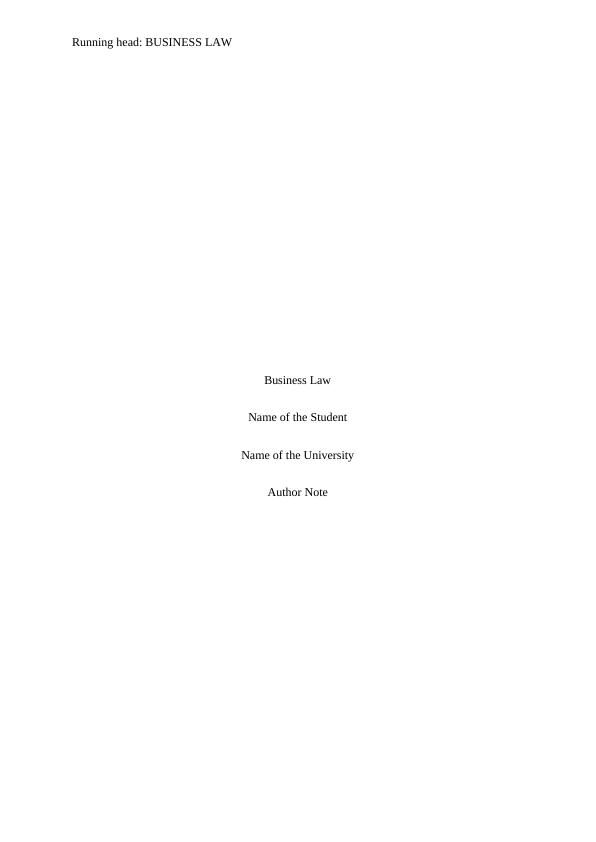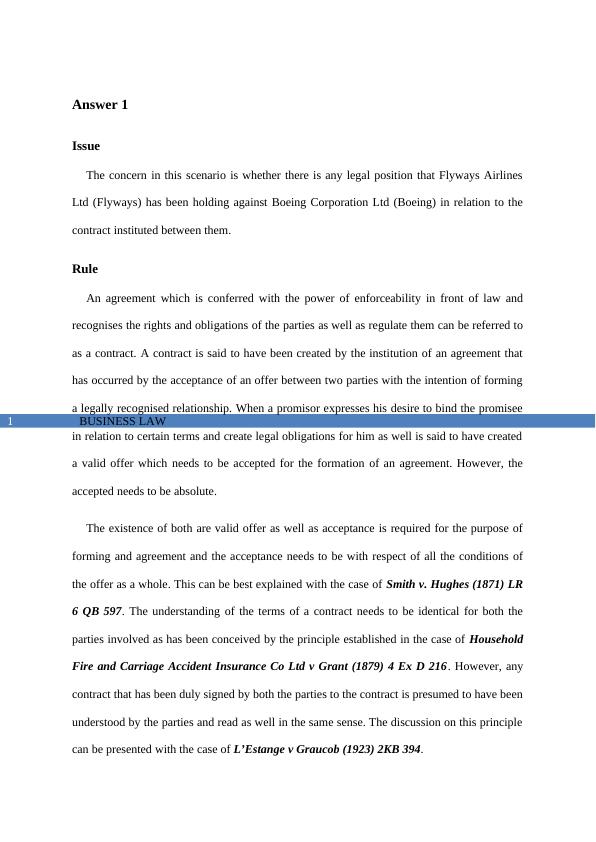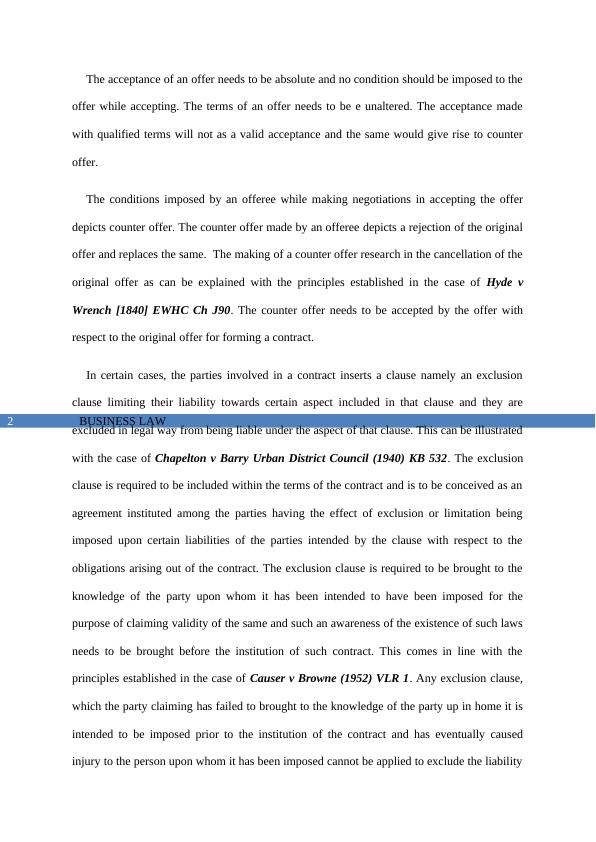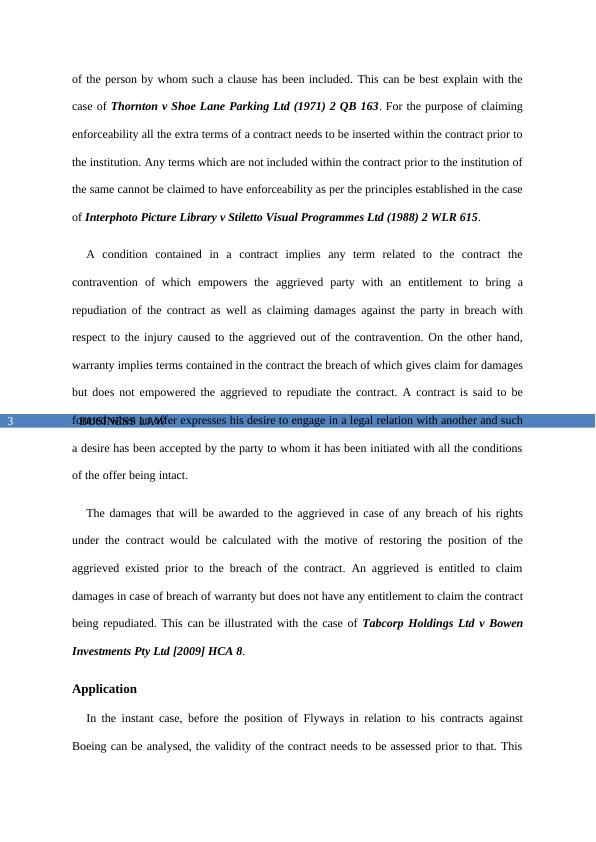Assignment | The concern in this scenario is whether there is any legal position that Flyways Airlines
11 Pages3501 Words12 Views
Added on 2022-10-01
Assignment | The concern in this scenario is whether there is any legal position that Flyways Airlines
Added on 2022-10-01
ShareRelated Documents
Running head: BUSINESS LAW
Business Law
Name of the Student
Name of the University
Author Note
Business Law
Name of the Student
Name of the University
Author Note

BUSINESS LAW1
Answer 1
Issue
The concern in this scenario is whether there is any legal position that Flyways Airlines
Ltd (Flyways) has been holding against Boeing Corporation Ltd (Boeing) in relation to the
contract instituted between them.
Rule
An agreement which is conferred with the power of enforceability in front of law and
recognises the rights and obligations of the parties as well as regulate them can be referred to
as a contract. A contract is said to have been created by the institution of an agreement that
has occurred by the acceptance of an offer between two parties with the intention of forming
a legally recognised relationship. When a promisor expresses his desire to bind the promisee
in relation to certain terms and create legal obligations for him as well is said to have created
a valid offer which needs to be accepted for the formation of an agreement. However, the
accepted needs to be absolute.
The existence of both are valid offer as well as acceptance is required for the purpose of
forming and agreement and the acceptance needs to be with respect of all the conditions of
the offer as a whole. This can be best explained with the case of Smith v. Hughes (1871) LR
6 QB 597. The understanding of the terms of a contract needs to be identical for both the
parties involved as has been conceived by the principle established in the case of Household
Fire and Carriage Accident Insurance Co Ltd v Grant (1879) 4 Ex D 216. However, any
contract that has been duly signed by both the parties to the contract is presumed to have been
understood by the parties and read as well in the same sense. The discussion on this principle
can be presented with the case of L’Estange v Graucob (1923) 2KB 394.
Answer 1
Issue
The concern in this scenario is whether there is any legal position that Flyways Airlines
Ltd (Flyways) has been holding against Boeing Corporation Ltd (Boeing) in relation to the
contract instituted between them.
Rule
An agreement which is conferred with the power of enforceability in front of law and
recognises the rights and obligations of the parties as well as regulate them can be referred to
as a contract. A contract is said to have been created by the institution of an agreement that
has occurred by the acceptance of an offer between two parties with the intention of forming
a legally recognised relationship. When a promisor expresses his desire to bind the promisee
in relation to certain terms and create legal obligations for him as well is said to have created
a valid offer which needs to be accepted for the formation of an agreement. However, the
accepted needs to be absolute.
The existence of both are valid offer as well as acceptance is required for the purpose of
forming and agreement and the acceptance needs to be with respect of all the conditions of
the offer as a whole. This can be best explained with the case of Smith v. Hughes (1871) LR
6 QB 597. The understanding of the terms of a contract needs to be identical for both the
parties involved as has been conceived by the principle established in the case of Household
Fire and Carriage Accident Insurance Co Ltd v Grant (1879) 4 Ex D 216. However, any
contract that has been duly signed by both the parties to the contract is presumed to have been
understood by the parties and read as well in the same sense. The discussion on this principle
can be presented with the case of L’Estange v Graucob (1923) 2KB 394.

BUSINESS LAW2
The acceptance of an offer needs to be absolute and no condition should be imposed to the
offer while accepting. The terms of an offer needs to be e unaltered. The acceptance made
with qualified terms will not as a valid acceptance and the same would give rise to counter
offer.
The conditions imposed by an offeree while making negotiations in accepting the offer
depicts counter offer. The counter offer made by an offeree depicts a rejection of the original
offer and replaces the same. The making of a counter offer research in the cancellation of the
original offer as can be explained with the principles established in the case of Hyde v
Wrench [1840] EWHC Ch J90. The counter offer needs to be accepted by the offer with
respect to the original offer for forming a contract.
In certain cases, the parties involved in a contract inserts a clause namely an exclusion
clause limiting their liability towards certain aspect included in that clause and they are
excluded in legal way from being liable under the aspect of that clause. This can be illustrated
with the case of Chapelton v Barry Urban District Council (1940) KB 532. The exclusion
clause is required to be included within the terms of the contract and is to be conceived as an
agreement instituted among the parties having the effect of exclusion or limitation being
imposed upon certain liabilities of the parties intended by the clause with respect to the
obligations arising out of the contract. The exclusion clause is required to be brought to the
knowledge of the party upon whom it has been intended to have been imposed for the
purpose of claiming validity of the same and such an awareness of the existence of such laws
needs to be brought before the institution of such contract. This comes in line with the
principles established in the case of Causer v Browne (1952) VLR 1. Any exclusion clause,
which the party claiming has failed to brought to the knowledge of the party up in home it is
intended to be imposed prior to the institution of the contract and has eventually caused
injury to the person upon whom it has been imposed cannot be applied to exclude the liability
The acceptance of an offer needs to be absolute and no condition should be imposed to the
offer while accepting. The terms of an offer needs to be e unaltered. The acceptance made
with qualified terms will not as a valid acceptance and the same would give rise to counter
offer.
The conditions imposed by an offeree while making negotiations in accepting the offer
depicts counter offer. The counter offer made by an offeree depicts a rejection of the original
offer and replaces the same. The making of a counter offer research in the cancellation of the
original offer as can be explained with the principles established in the case of Hyde v
Wrench [1840] EWHC Ch J90. The counter offer needs to be accepted by the offer with
respect to the original offer for forming a contract.
In certain cases, the parties involved in a contract inserts a clause namely an exclusion
clause limiting their liability towards certain aspect included in that clause and they are
excluded in legal way from being liable under the aspect of that clause. This can be illustrated
with the case of Chapelton v Barry Urban District Council (1940) KB 532. The exclusion
clause is required to be included within the terms of the contract and is to be conceived as an
agreement instituted among the parties having the effect of exclusion or limitation being
imposed upon certain liabilities of the parties intended by the clause with respect to the
obligations arising out of the contract. The exclusion clause is required to be brought to the
knowledge of the party upon whom it has been intended to have been imposed for the
purpose of claiming validity of the same and such an awareness of the existence of such laws
needs to be brought before the institution of such contract. This comes in line with the
principles established in the case of Causer v Browne (1952) VLR 1. Any exclusion clause,
which the party claiming has failed to brought to the knowledge of the party up in home it is
intended to be imposed prior to the institution of the contract and has eventually caused
injury to the person upon whom it has been imposed cannot be applied to exclude the liability

BUSINESS LAW3
of the person by whom such a clause has been included. This can be best explain with the
case of Thornton v Shoe Lane Parking Ltd (1971) 2 QB 163. For the purpose of claiming
enforceability all the extra terms of a contract needs to be inserted within the contract prior to
the institution. Any terms which are not included within the contract prior to the institution of
the same cannot be claimed to have enforceability as per the principles established in the case
of Interphoto Picture Library v Stiletto Visual Programmes Ltd (1988) 2 WLR 615.
A condition contained in a contract implies any term related to the contract the
contravention of which empowers the aggrieved party with an entitlement to bring a
repudiation of the contract as well as claiming damages against the party in breach with
respect to the injury caused to the aggrieved out of the contravention. On the other hand,
warranty implies terms contained in the contract the breach of which gives claim for damages
but does not empowered the aggrieved to repudiate the contract. A contract is said to be
formed when an offer expresses his desire to engage in a legal relation with another and such
a desire has been accepted by the party to whom it has been initiated with all the conditions
of the offer being intact.
The damages that will be awarded to the aggrieved in case of any breach of his rights
under the contract would be calculated with the motive of restoring the position of the
aggrieved existed prior to the breach of the contract. An aggrieved is entitled to claim
damages in case of breach of warranty but does not have any entitlement to claim the contract
being repudiated. This can be illustrated with the case of Tabcorp Holdings Ltd v Bowen
Investments Pty Ltd [2009] HCA 8.
Application
In the instant case, before the position of Flyways in relation to his contracts against
Boeing can be analysed, the validity of the contract needs to be assessed prior to that. This
of the person by whom such a clause has been included. This can be best explain with the
case of Thornton v Shoe Lane Parking Ltd (1971) 2 QB 163. For the purpose of claiming
enforceability all the extra terms of a contract needs to be inserted within the contract prior to
the institution. Any terms which are not included within the contract prior to the institution of
the same cannot be claimed to have enforceability as per the principles established in the case
of Interphoto Picture Library v Stiletto Visual Programmes Ltd (1988) 2 WLR 615.
A condition contained in a contract implies any term related to the contract the
contravention of which empowers the aggrieved party with an entitlement to bring a
repudiation of the contract as well as claiming damages against the party in breach with
respect to the injury caused to the aggrieved out of the contravention. On the other hand,
warranty implies terms contained in the contract the breach of which gives claim for damages
but does not empowered the aggrieved to repudiate the contract. A contract is said to be
formed when an offer expresses his desire to engage in a legal relation with another and such
a desire has been accepted by the party to whom it has been initiated with all the conditions
of the offer being intact.
The damages that will be awarded to the aggrieved in case of any breach of his rights
under the contract would be calculated with the motive of restoring the position of the
aggrieved existed prior to the breach of the contract. An aggrieved is entitled to claim
damages in case of breach of warranty but does not have any entitlement to claim the contract
being repudiated. This can be illustrated with the case of Tabcorp Holdings Ltd v Bowen
Investments Pty Ltd [2009] HCA 8.
Application
In the instant case, before the position of Flyways in relation to his contracts against
Boeing can be analysed, the validity of the contract needs to be assessed prior to that. This

End of preview
Want to access all the pages? Upload your documents or become a member.
Related Documents
Assignment Business Law Rule Agreementlg...
|12
|3630
|18
Issue about Contract Law 2022lg...
|13
|3520
|22
Whether Qantas Airlines Ltd (Qantas) is entitled to claim compensation from Airbus Corporation Ltd (Airbus) Rule 1 2 Question 1 Issuelg...
|10
|2337
|499
Business Law - Qantas Airlines Ltdlg...
|10
|2240
|201
Business Laws Assignment Doclg...
|10
|2265
|36
Contract Law Assignment : Qantas Airlines Ltdlg...
|12
|2266
|391
